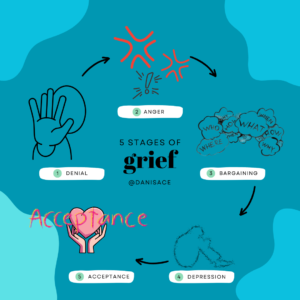Denial, Anger, Bargaining, Depression, Acceptance
Understanding the five processes through grief and trauma
This understanding is from personal experience and research.
Trauma can appear in any capacity, it can look like a loss or a physical trauma, if it affects you negatively in a large capacity for an extensive amount of time, this is trauma. Everyone experiences trauma differently.
Please be mindful that although these are common stages of processing grief and trauma an individual may not process them within this order, stages may also be revisited, and if there are several traumas at once, please seek professional guidance, as you are trying to process several different stages, this can lead to PTSD which is a bit more intense and requires support. For more information on numerous traumas and its impacts please see ‘it comes in threes’ blog.
The five stages of grief, as developed by psychiatrist Elisabeth Kübler-Ross, are:
- Denial
- Anger
- Bargaining
- Depression
- Acceptance
Each stage is critical to healing appropriately, each stage has no time limit, it could take days, weeks or even month to get through these stages. But it is crucial that you understand these stages and if you are experiencing trauma to understand which stage you are within.
Denial: The initial stage where individuals may refuse to accept the reality of the loss. Within this behaviour individuals may act out in disbelief.
By being within this stage, it acts as a buffer to delay the reality of a difficult situation in order for a person to be able to process this information properly. It is a psychological defence mechanism of the brain; it helps to manage the initial shock and emotional pain. Being in this stage, can appear as an auto-pilot movement, being numb, not registering any new information, avoidance of the initial trauma or one may endure in mindless activities to avoid the emotional impact.
Denial is important because it allows us to pace grief, allowing emotions to be processed gradually, this prevents an individual from being too overwhelmed.
Anger: Feelings of frustration and helplessness may manifest as anger towards oneself or others.
As the initial trauma begins to set in, one may become angry towards themselves or others. Finding agitation / frustration within many different settings. As you begin to process the information and accept the reality many can find themselves angry, angry towards the deceased, towards loved ones or even inanimate objects.
This process acts as a coping mechanism if one feels helpless within the present moment, anger allows them to feel in control as they are processing information. Anger also masks other emotions such as sadness, fear or disappointment.
If the anger is not addressed or understood it can progress into more negative behaviours such as escalation, an outburst, negative internal thoughts such as suicide, erratic / impulsive behaviour and many more.
Anger is important as it is a natural human emotion to pain, and experiencing it within grief is a natural occurrence, understanding this is crucial to processing it effectively.
Always remember it is okay to be angry; you just don’t need to be mean.
Bargaining: The stage where individuals may try to negotiate or bargain for a way to reverse or lessen the loss.
This stage can look like many things, like fawning where one goes back to the pain to seek healing, desperation where individuals may beg / plea for a reverse or less negative impact via a resolution of some manner.
They are characterized with subconscious terms such as ‘what if’, where an individual may try to bargain with their outcome in a bid to try and alter it or lessen the impact.
It can look like re-examining the past, seeking control, guilt and shame, seeking meaning. This can be quite a difficult process as sometimes you may not get the outcome you want / deserve.
Examples of bargaining can look like, ‘if only I had worked harder’, ‘if only I tried harder’, ‘what if I reached out’, please when within this bargaining stage try to think logically if you are to reach out anywhere within your past.
This is one of the tougher stages to process as you don’t always get the outcome you want, it can be quite painful for an individual to endure, but if you are within this stage and do require support please reach out. Also, this stage is important because it helps an individual accept the reality of what has happened.
Depression: A deep sense of sadness and regret may occur as the individual begins to understand the extent of the loss.
This is also a tough stage but requires patience and peace. Please listen to your body, if you require rest, please rest. Also ensure you are drinking water and eating as healthy as you are able too.
If you end up within solitude and away from people you love and who love you then please ensure you are safe here, if you need support please reach out.
This is the pain that was due all along, the previous stages just delay this burden. This is important because it allows us to feel the reality of the initial pain, in order for us to move onto the final stage we must sit here. It will be okay, you will come back to yourself soon.
Acceptance: The final stage where individuals come to terms with the loss and find a way to move forward.
You come to terms with what has happened, you may not understand why it happened still but you have come to an acceptance stage, where you can say that it happened and that you are finally ready to move on with your life.
Sending love to anyone who is experiencing these stages. If you would like more information on moving on from trauma please see the blog linked here.
Thankyou for reading, all my love D x

2 thoughts on “5 stages of grief”